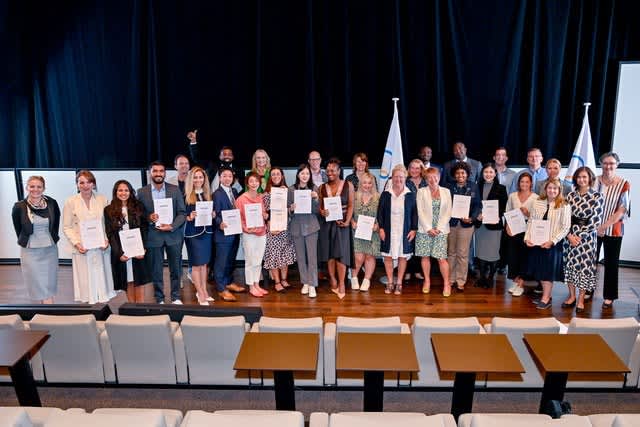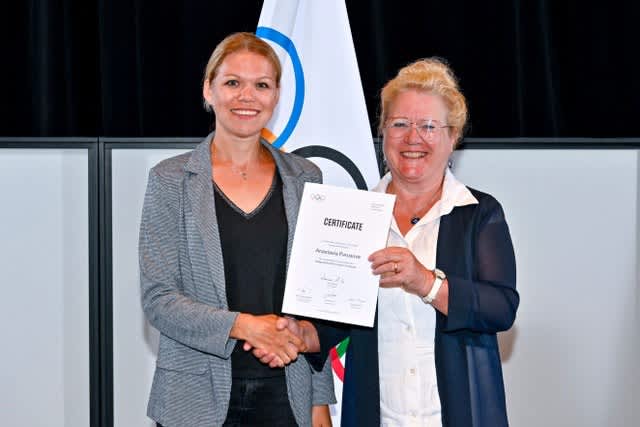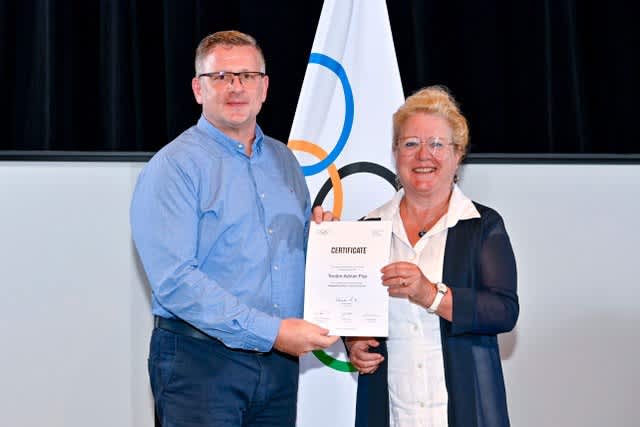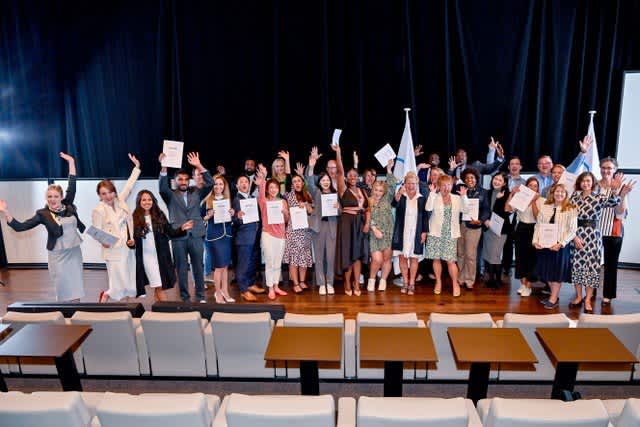Generally speaking, safeguarding is a term used to denote measures to protect the health, well-being and human rights of individuals. It allows people, particularly children, young people and vulnerable adults, to live free from abuse, harm and neglect.
Applied in the sports world, safeguarding, which is a combination of SAFE from harassment and abuse in sport and GUARDING athletes' rights, means the steps and actions that are taken to promote the welfare of those in sport and prevent them from experiencing harm or maltreatment. The key concept is therefore prevention, which is distinctly different from protection, which refers to measures for those who are already experiencing harm.
Anastasia Parusova and Teodor Pop said, "It is historic, knowing that it was the first course of this kind and we consider it a great step taken in judo."
The course, which represented 250 hours of work across all modules, started a year ago, in September 2021 and the final exam took place in June. It consisted of online sessions and lectures in parallel with daily work. As both our candidates stated, it was not easy. The programme was led by Kirsty Burrows (GBR), Managing Director, Sports Rights Solutions, IOC Safe Sport Consultant and IOC Deputy Safeguarding Officer, Susan Greinig (GBR), IOC Medical Programmes Senior Manager, Medical and Scientific Department and IOC Safeguarding Officer, and Anne Tiivas OBE (GBR), Chair of Safe Sport International (SSI) and many others.
The diploma ceremony took place in Lausanne, in the vicinity of the Olympic Museum, where Anastasia Parusova and Teodor Pop were able to connect and get to know the other students. They were really happy, for instance, to meet with Aljaž Sedej from Slovenia, who also completed the course and who has a judo background. This will help to create a global network in the future to fight against harassment and abuse of any kind in sports.
HRH Prince Feisal al Hussein, IOC Executive Board Member, Chair of the IOC Prevention of Harassment and Abuse in Sport Working Group, said, "Everyone in sport has the right to a safe sporting environment, one that is fair, equitable and free from all forms of harassment and abuse. Unfortunately this is not the reality for everyone. Evidence and testimonies demonstrate that harassment and abuse in sport occurs worldwide at every level across all sporting disciplines. Also this is not solely an issue for sport, it's a reflection on an endemic issue in wider society. There are certain risk factors that may increase the likelihood of harassment and abuse in a sporting context and there is much that can be done to mitigate these risks. The IOC continues to place great importance on this critical area of athlete welfare.
I would like to congratulate you for taking this course and for your dedication to the protection of athletes. Safeguarding officers and those who serve as focal points for safeguarding issues, working in the field of sport integrity, play an extremely important and sensitive role for any organisation. Providing support for concerned persons is crucial for a safeguarding framework. You hold a position of trust. This course equips you with the knowledge, skills and confidence to fulfill the role of safeguarding officers for your organisation, to guarantee friendship, excellence and respect for everyone."
Emma Terho, IOC Executive Board Member, chair of the IOC Athletes' Commission, said, "The practice of sport is a human right and every child has the right to play. However, this right can not be practised and athletes can not give their best if there is harassment or abuse of any kind. It is often difficult to recognise harassment and abuse and it can be hard to speak up and to trust that, if you do, something will be done. This is why the role of a safeguarding officer is so vitally important. Safeguarding officers will make sure that there is always someone available to speak to and offer support in case of any concern, someone they trust, who is trained to deal with sensitive cases and who understands the stress that they are feeling; omeone also who clearly explains the process that will be followed and that this process is fair. Safe sport is a series of small steps that together make an enormous difference."
Susan Greinig and Kirsty Burrows also explained that, "What is safe in sport is when sport is fair, equitable and free from all forms of non-accidental violence, while Anne Tiivas OBE added, 'Safeguarding officers play a critically important role. This is a rewarding role but also challenging. Everyone has to play a role in any organisation and athletes have an absolute right to engage in safe sport, wherever they are".
The IJF is happy to welcome Anastasia Parusova and Teodor Pop in their new roles as Safeguarding Officers. They already know judo and our organisation. There is no doubt they will bring something new, which is definitely and perfectly in line with the judo moral code and values. There is no place for harassment and abuse in sport and especially not in judo.
Credit © 2022 / Comité International Olympique (CIO) / C. Moratal
The photos may not be used for any commercial and/or promotional purposes, including promotion of a third party or the products or services of a third party
Download the IJF Safeguarding document




